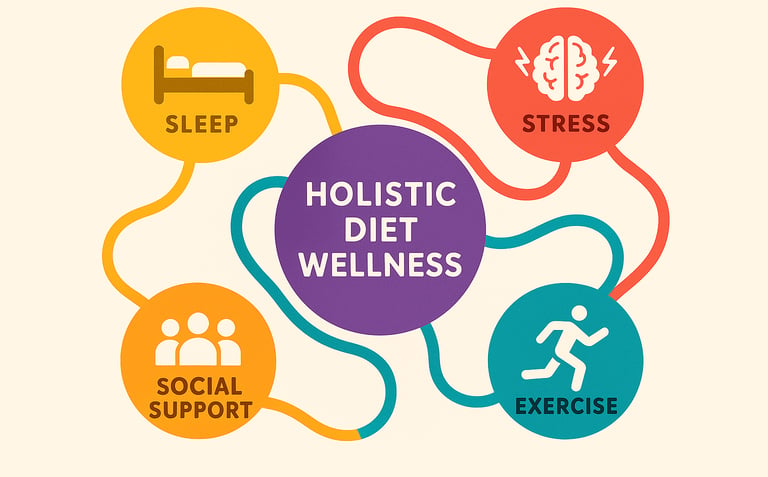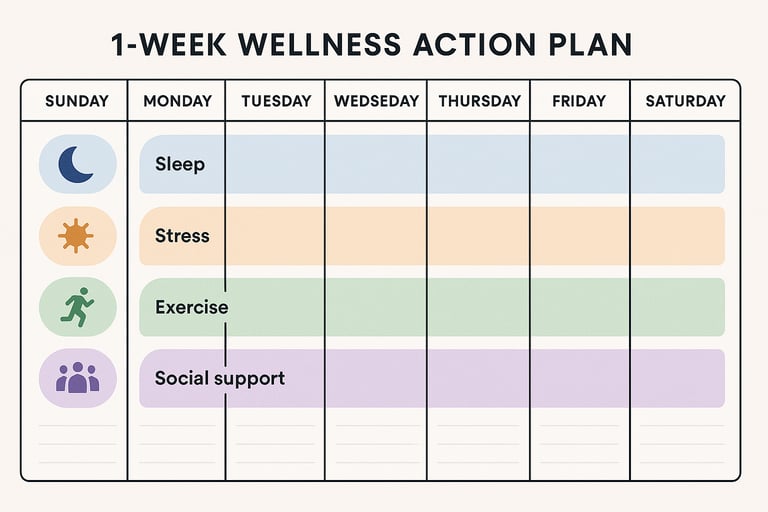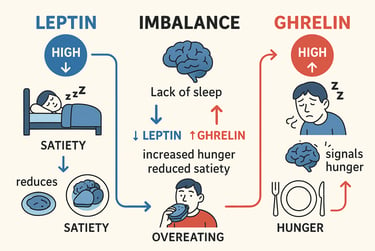Unlock Diet Success: Beyond Calories and Sleep
"Discover how diet success hinges on sleep, stress management, exercise and social support. Follow our 1-week wellness action plan for lasting health results."
MEAL PLANNING


Introduction: Beyond Calories—The Hidden Forces Behind Diet Success
Achieving lasting diet success extends far beyond simply counting calories or restricting food intake. Groundbreaking research reveals that multiple lifestyle factors significantly influence dietary adherence and weight management outcomes. This holistic approach recognizes that sleep quality, stress management, physical activity patterns, and social relationships form the foundation of sustainable weight loss.
Recent meta-analyses demonstrate that holistic mobile health interventions combining multiple lifestyle factors achieve significant weight loss (average 1.70 kg reduction) and stress reduction compared to single-focus approaches. The evidence is clear: successful dieting requires addressing the intricate web of biological, psychological, and social factors that influence our eating behaviors.
Modern research indicates that combining healthy diet with adequate exercise and quality sleep offers more benefits than improving diet alone. This comprehensive understanding sets the stage for exploring how sleep cycles, stress responses, physical activity, and social connections work together to either support or sabotage your dietary goals.The Science of Sleep: Your Body's Weight Loss Command Center
Hormonal Disruption from Sleep Deprivation
Sleep plays a crucial role in regulating hunger hormones that directly control appetite and food cravings. Research consistently shows that insufficient sleep disrupts leptin and ghrelin levels—the two primary hormones responsible for hunger and satiety signals.
Key findings from sleep research:
Ghrelin increases by 22-30% after sleep deprivation, triggering intense hunger
Leptin levels decrease significantly with chronic sleep restriction, reducing satiety signals
Single night of sleep loss is sufficient to elevate hunger ratings and ghrelin levels
Sleep-deprived individuals consume 40% more calories on high-stress days
The Sleep-Diet Connection
Studies demonstrate that people who sleep less than 7 hours nightly have higher BMIs and increased risk of obesity. Sleep deprivation creates a "double whammy" effect where elevated ghrelin stimulates appetite while decreased leptin fails to signal fullness.
Sleep quality also influences food choices:
Higher cravings for high-calorie, processed foods when sleep-deprived
Reduced intake of fruits, vegetables, and whole grains with inadequate sleep
Disrupted glucose metabolism and insulin sensitivity with poor sleep patterns
Optimizing Sleep for Diet Success
Evidence-based sleep strategies:
Maintain 7-9 hours nightly as recommended by sleep research
Establish consistent sleep-wake times to strengthen circadian rhythms
Create calming bedtime routines including meditation or reading
Limit screen exposure 1-2 hours before bed to preserve melatonin production
Avoid late-night eating which can disrupt sleep quality and glucose tolerance
Understanding Stress: The Hidden Diet Saboteur
The Cortisol-Eating Connection
Chronic stress triggers powerful biological responses that directly undermine dietary success. When stressed, the hypothalamic-pituitary-adrenal (HPA) axis releases cortisol, which increases appetite for energy-dense, high-sugar, and high-fat foods.
Research reveals the stress-eating cycle:
Cortisol elevation increases cravings for comfort foods by up to 40%
Stress activates reward pathways in the brain, reinforcing emotional eating behaviors
Emotional eating affects all age groups, with higher prevalence in women and those with elevated BMI
Chronic stress disrupts interoceptive awareness—the ability to distinguish hunger from emotions
Gender and Individual Differences
Studies show significant variations in stress responses:
Women tend to engage in "comfort eating" more than men during stressful periods
Individuals with higher emotional eating scores show stronger responses to stress-induced food intake
College students with high perceived stress consume more sweets and soft drinks
Evidence-Based Stress Management for Diet Success
Effective stress reduction techniques:
Mindfulness meditation reduces cortisol levels and emotional eating behaviors
Regular physical activity helps regulate stress hormones and improves mood
Deep breathing exercises activate the parasympathetic nervous system
Social support networks provide crucial emotional regulation resources
Professional counseling when stress levels significantly impact daily life
Physical Activity: Beyond Calorie Burning
Metabolic and Psychological Benefits
Physical activity provides multifaceted benefits that extend far beyond simple calorie expenditure. Research demonstrates that regular exercise enhances mood, reduces stress, and supports dietary adherence through various mechanisms.
Key exercise benefits for diet success:
Moderate-intensity activity improves sleep quality more effectively than vigorous exercise
Exercise releases endorphins that naturally elevate mood and reduce stress
Physical activity increases insulin sensitivity and improves glucose metabolism
Regular movement enhances metabolic flexibility—the ability to switch between fuel sources
Optimal Exercise Strategies
Research-backed exercise recommendations:
Combine aerobic and resistance training for maximum metabolic benefits
Moderate-intensity exercise (150 minutes weekly) shows superior results for sleep and mood
Evening exercise sessions over 90 minutes can negatively impact sleep quality
Individual activities like tai chi, yoga may provide better sleep outcomes than group exercises
The Exercise-Diet Synergy
Studies show that individuals who engage in consistent physical activity are more likely to maintain balanced diets over time. This creates a positive feedback loop where exercise supports dietary adherence, which in turn provides energy for continued physical activity.
Social Support: The Power of Connection
Types of Social Support and Their Impact
Social relationships significantly influence dietary success through various mechanisms. Research identifies distinct
types of social support with different effects on weight loss outcomes.
Key types of social support:
Emotional support: Encouragement and empathy during challenging periods
Instrumental support: Practical help with meal preparation, shopping, or exercise
Informational support: Sharing knowledge, tips, and resources
Companionship support: Participating in healthy activities together
Research Findings on Social Support and Weight Loss
Compelling evidence demonstrates:
71.6% of women with frequent family and friend support achieved successful weight loss vs. 45.7% with no family support
Family support appears more important than friend support for long-term weight management
Social support for physical activity completely mediated the relationship between support and weight loss
Participants with physical activity companions lost 2.5 percentage points more weight
Building Effective Support Networks
Strategies for cultivating social support:
Identify accountability partners with similar health goals
Join group activities like cooking classes or exercise groups
Communicate specific needs to family and friends
Engage in meal planning and preparation as social activities
Participate in online communities focused on health and wellness
Advanced Factors: Circadian Rhythms and Meal Timing
The Science of Chrono nutrition
Meal timing plays a crucial role in metabolic health by interacting with circadian rhythms. Research in chrono nutrition reveals that when you eat may be as important as what you eat.
Key chrono nutrition findings:
Early time-restricted eating improves glucose levels and substrate oxidation
Late-night eating correlates with elevated glucose intolerance during circadian low points
Consuming meals during elevated melatonin levels (nighttime) impairs glucose tolerance
Consistent meal timing from dawn to dusk enhances circadian rhythmicity and metabolic health
Implementing Circadian-Aligned Eating
Evidence-based meal timing strategies:
Consume larger meals earlier in the day when insulin sensitivity is highest
Limit eating to a 10-12 hour window aligned with daylight hours
Avoid late-night snacking especially 3-4 hours before bedtime
Maintain consistent meal times to strengthen circadian synchronization
Comprehensive 14-Day Integrated Wellness Action Plan
Week 1: Foundation Building
Day 1-2: Sleep Optimization
Track current sleep patterns using a sleep diary
Establish consistent bedtime and wake times (±30 minutes daily)
Create technology-free bedroom environment
Target: 7-9 hours of quality sleep nightly
Day 3-4: Stress Assessment and Management
Complete perceived stress scale assessment
Practice 10-minute morning mindfulness meditation
Implement deep breathing exercises during stressful moments
Target: Reduce perceived stress through daily mindfulness practice
Day 5-7: Movement Integration
Assess current physical activity levels
Begin with 30-minute moderate-intensity walks daily
Add 2 resistance training sessions weekly
Target: 150 minutes moderate exercise weekly
Week 2: Advanced Integration
Day 8-9: Social Support Activation
Identify potential accountability partners
Plan one shared healthy meal with family or friends
Join online wellness community or local fitness group
Target: Establish at least one active support relationship
Day 10-11: Circadian Eating Implementation
Plan meals within 10-12 hour eating window
Consume largest meal earlier in the day
Avoid eating 3 hours before bedtime
Target: Align eating patterns with natural circadian rhythms
Day 12-14: Comprehensive Integration
Combine all elements: quality sleep, stress management, exercise, social support
Track mood, energy levels, and eating patterns
Adjust strategies based on what works best for your lifestyle
Target: Create sustainable, integrated wellness routine
Frequently Asked Questions: Evidence-Based Answers
Q: How much sleep do I actually need for optimal weight management?
A: Research consistently shows adults require 7-9 hours of quality sleep nightly for optimal hormonal regulation. Studies demonstrate that sleeping less than 7 hours increases ghrelin by up to 30% and significantly reduces leptin levels, directly impacting hunger and satiety.
Q: Can I still lose weight during high-stress periods?
A: Yes, but it requires strategic stress management. Research shows stress can increase caloric intake by 40% on stressful days, but individuals who practice mindfulness and regular physical activity can mitigate these effects. The key is implementing evidence-based stress reduction techniques.
Q: What type of exercise is best for supporting diet success?
A: Moderate-intensity exercise (150 minutes weekly) combined with resistance training provides optimal benefits for sleep, mood, and metabolic health. Research shows this combination is more effective than vigorous-only exercise for supporting dietary adherence.
Q: How important is social support for weight loss?
A: Extremely important. Studies show participants with strong social support for physical activity lost 2.5 percentage points more weight than those without support. Family support appears particularly crucial, with 71.6% success rates compared to 45.7% without family support.
Q: Does meal timing really matter for weight loss?
A: Yes, chrononutrition research demonstrates that meal timing significantly impacts metabolic health. Early time-restricted eating improves glucose control and substrate oxidation, while late-night eating during elevated melatonin periods impairs glucose tolerance.
Q: How long does it take to see results from this holistic approach?
A: Meta-analyses show significant weight loss (1.70 kg average) within 3 months of integrated lifestyle interventions. However, improvements in sleep quality, stress levels, and mood often occur within 1-2 weeks of consistent implementation.
Measuring Your Progress: Key Indicators
Track these evidence-based metrics:
Sleep quality and duration (7-9 hours nightly)
Perceived stress levels using validated scales
Physical activity minutes (target 150 weekly)
Social support engagement (weekly interactions)
Meal timing consistency within circadian windows
Body weight trends (weekly measurements)
Energy levels and mood (daily 1-10 scale ratings)
Conclusion: Your Path to Sustainable Diet Success
The evidence is overwhelming: sustainable diet success requires a holistic approach that addresses sleep, stress, exercise, and social support alongside nutritional choices. Research demonstrates that individuals who integrate these lifestyle factors achieve greater weight loss, improved adherence, and better long-term outcomes than those focusing solely on food restriction.
Key takeaways from the research:
Sleep deprivation can sabotage even the best diet plans through hormonal disruption
Chronic stress increases caloric intake and promotes emotional eating behaviors
Regular exercise provides metabolic and psychological benefits that support dietary adherence
Strong social support networks increase weight loss success by up to 26 percentage points
Proper meal timing aligns with circadian rhythms for optimal metabolic function
Begin your holistic journey today by selecting one area for immediate implementation. Whether it's optimizing your sleep schedule, incorporating stress management techniques, increasing physical activity, or building social support, each step creates a foundation for lasting diet success.
Remember: sustainable weight management is not about perfection—it's about creating an integrated lifestyle that naturally supports your health goals through evidence-based strategies that work synergistically to transform your relationship with food and wellness.






Connect
Stay updated with our latest diet tips.
Legal
www.thedietplanner.com © 2025. All rights reserved.
